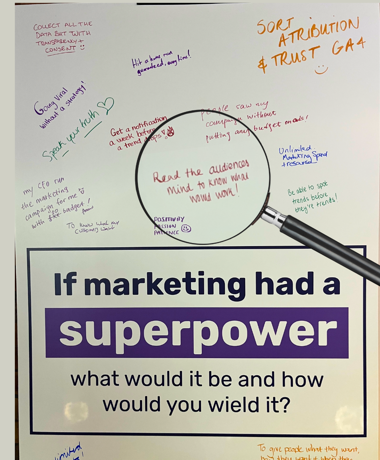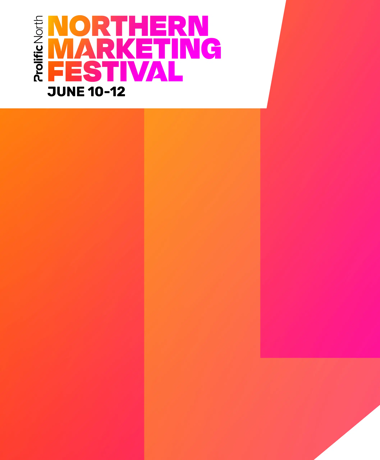Marketing in 2021 had to traverse a very wide range of challenges - as people’s lives continued to change due to the pandemic and digital skyrocketed as the channel of choice for consumers.
Brands were forced to think of new ways to reach customers - whether that be FMCG producers adapting to reduced footfall numbers in supermarkets, B2B suppliers not being able to engage partners at events and trade shows, or the overall drive towards sustainability and environmental responsibility.
What’s more, brands which already had a strong digital presence faced vastly increased competition for people’s attention, requiring them to truly up their game in order to be heard above the noise and stand out in a crowded market.
But despite all this, companies in 2021 continued to impress with their marketing campaigns both traditional and digital, working in-house or with their agency partners to create unforgettable marketing work which increased their brand awareness, sales figures, and positive brand sentiment.
In no particular order, let’s look at which were 2021’s very best marketing campaigns, and inspire you for the rest of 2022.
#FreeCuthbert - Aldi
2021 was defined by some cheeky social media activations whose results were remarkable - perhaps down to customers’ increased time spent online combined with a thirst for dramatic moments and characters.
This reactive campaign took something serious and dry - a case of trademark infringement brought against Aldi by Marks & Spencer for its Cuthbert caterpillar cake - and made it a success for Aldi, drumming up huge online support for the supermarket.
M&S didn’t count on Aldi responding to its claim of infringement with a series of light-hearted #FreeCuthbert tweets supported by agency McCann Manchester, trending on Twitter, picked up by national media outlets, and becoming a central part of the national conversation.
Allegedly its largest ever news story, Aldi has estimated that the #FreeCuthbert campaign’s organic reach was equivalent to a media spend worth at least £5 million.
Beanz on bix - Weetabix
Another light-hearted crossover social campaign, from early in 2021, came when Weetabix - in collaboration with agency Frank PR - posted a tweet that nobody expected.
Building on its long-running campaign of collecting and sharing ways people enjoy their Weetabix, the cereal brand posted this tweet, encouraging people to enjoy their cereal with baked beans.
A campaign which Marketing Week readers voted as the best of 2021, Beanz on bix drew both amusement and shock from those who saw it, as well as starting online conversations with a wide range of brands joining the conversation.
It was discussed in Parliament, drove sales growth of 15%, saw attention scores grow by 10 points, and helped the brand acquire more than 20,000 new social followers.
Welcome Back - Guinness
After lockdown led to the hospitality industry closing for an extended period, something which hit pubs and bars incredibly hard, many were incredibly keen to get back to their favourite watering holes. And one of the scarcest things during that closure period was a ‘proper’ pint of Guinness.
Guinness’s Welcome Back campaign, created by AMV BBDO, was launched ahead of pubs reopening in May 2021 and emphasised that Guinness understood how people are so keen to return to the bar they were seeing pints everywhere.
It used a pair of socks on a washing line, a white cat on a bin, a half-painted garage door and even clothes in a laundrette’s washing machine to create compositions reminiscent of an instantly-recognisable Guinness. The campaign was accompanied by a social campaign using the hashtag #LooksLikeGuinness, and made Guinness the most talked-about beer brand on social.
Backing British Creativity - BBC
With more people than ever streaming, the BBC moved to show viewers everything they could expect from iPlayer and its more linear channels by repurposing its abbreviation to encompass its wide offering.
It promoted drama, documentary, comedy and more using slogans including Blimmin Bent Coppers for Line of Duty, Bad Boy Charm for Peaky Blinders’ Tommy Shelby, and Balletic Ball Control for sports coverage including Wimbledon and the Six Nations.
It helped remind viewers of the breadth of the BBC’s offering at a time when competing streaming services continued to grow and challenge their position - and neatly collected promos for the broadcaster’s content all in one place in a natural way.
Worldwide Hide - Cadbury
Looking to digital innovation, Cadbury launched the Worldwide Hide campaign for Easter 2021, letting people give to loved ones when they couldn’t be together in person.
Using augmented reality, Cadbury let people buy a real Easter Egg and hide it virtually anywhere in the world using Google Maps. They would then write a clue for the recipient to find the egg. Free and paid-for options were available with the special editions delivered directly to the recipient’s home when found.
It was accompanied by a TV, video-on-demand, social, digital, out-of-home, PR, in-store and online campaign, and developed in collaboration with VCCP.
As a result, 680,000 eggs were hidden as part of the campaign and 14,500 special edition eggs were bought. Cadbury’s site was visited nearly 1.8 million times as a result.
Wasteminster - Greenpeace
This awareness-raising campaign from Greenpeace had a huge effect in helping people understand the impact of plastic pollution and the UK’s responsibility.
It uses puppets and audio clips to show the Prime Minister and the whole of Downing Street drowned by plastic waste, contrasting the Government’s claims of ecological success with the eye-opening statement that what is shown - 1,800,000kg of plastic - is “dumped on other countries every single day”.
Reverse Selfie - Dove
“The pressure of social media is hurting our girls’ self-esteem.” This is the main message of Dove’s moving Reverse Selfie campaign, which shows in reverse the process of the central figure taking a natural photo, filtering it, and posting it online.
It encourages people to have “the selfie talk” to help young people overcome issues with self-confidence and comparisons with others’ filtered images online. An issue Dove says has been exacerbated by the pandemic, the brand said it wanted to “reverse the negative effects of social media and build resilience.”
It was created by Ogilvy and now has nearly a million YouTube views - overall, a campaign with great impact.
If you want to work with some of the leading agencies which are behind some of the best marketing campaigns, explore all the agency partners listed on the directory.
Back to news & insights
Latest News & Insights





